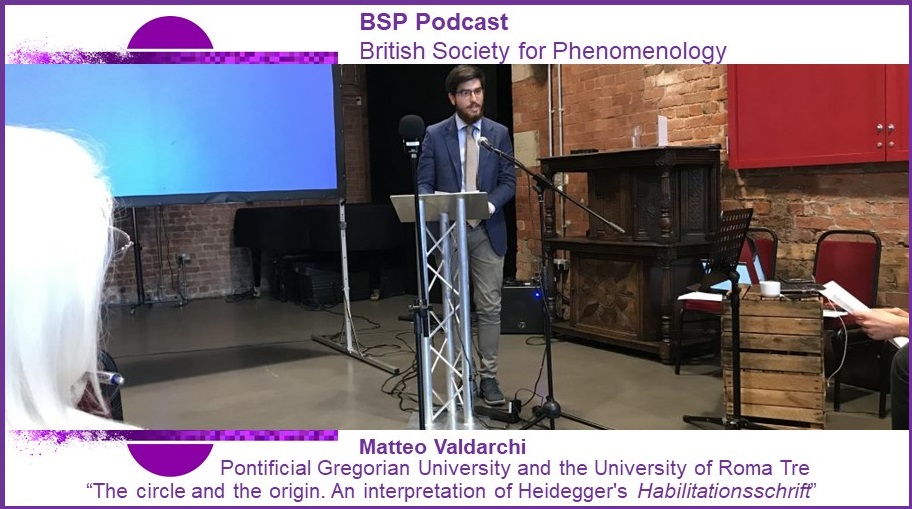Season four of the BSP podcast continues with another presentation from our 2019 annual conference held in Manchester last September.
Season 4 episode 80: 4 July 2020
Season four of the BSP Podcast continues with a paper from Matteo Valdarchi, Pontificial Gregorian University and the University of Roma Tre. The recording is taken from our 2019 Annual Conference, ‘The Theory and Practice of Phenomenology’.
Matteo Valdarchi: ‘The circle and the origin. An interpretation of Heidegger’s Habilitationsschrift’
You can listen to this episode on the BSP’s Podbean site, and you can also find it on iTunes and all good podcasting apps by searching ‘BSP Podcast’.
ABSTRACT: Since his early stages, the young Heidegger embraced with fervour the Husserlian phenomenological method (at least the one contained in the Logische Untersuchungen), although he immediately kept his distance from it, introducing a new way of doing phenomenology, independent and more fundamental. Not surprisingly, the phenomenological project that arises from his early works is called «Ursprungswissenschaft». But where can we find the seeds of this “science”? Usually, those can be identified in the course of the Kriegsontsemester (1919). The aim of this paper is to show that the very beginning of this project is, instead, in his post-doctoral dissertation, Die Kategorien- und Bedeutungslehre des Duns Scotus. The Habilitationsschrift unfolds a movement that starts from the exclusion of the Aristotelian-scholastics “metaphysics” from the question of categories (namely, of being), in favour of the immanence of the subjectivity in the judgement. With this first movement, the meaning of ‘being’ is radically transformed, changing from “being that actually exists” to “being that’s valid” (gilt) of the copula. The second movement (or counter-move) shows the intentional disposition of the logical setting, enlightening the material principle that determines logical forms: the categories of meaning that weave the sphere of language. It is at this level that the young Heidegger, although adopting the teaching of the IV research, already allows the origin of the logic to emerge from a more fundamental field, that is language, in which ‘being’ neither it’s a “is” nor it is valid, but it means. However here the language isn’t entangled in the theoretical (“circular” in 1919) subjectivity’s tangles, but it opens the way to a new understanding of the subjectivity, of the «historischer Geist». In conclusion, Heidegger’s original appropriation of the phenomenological method lies in understanding of the essence of language, as field of the subjectivity’s historically living movement.

BIO: Matteo Valdarchi studied philosophy at the Pontificial Gregorian University (until 2016) and at the University of Roma Tre (until 2018). His research area includes phenomenology and hermeneutics, particularly Heidegger’s thinking. He has taken part in two national conferences, at the 62° and at the 63° Convegno di Ricerca Filosofica organized by Centro Studi Filosofici di Gallarate.
The ‘British Society for Phenomenology Annual Conference 2019 – the Theory and Practice of Phenomenology’ was held at the International Anthony Burgess Foundation, Manchester, UK, 5 – 7 September, 2019.
Registration is now open for our 2020 annual conference: ‘Engaged Phenomenology’’ – the BSP Annual Conference, with the University of Exeter, co-sponsored by Egenis and the Wellcome Centre for Cultures and Environments of Health. Thursday 3 – Saturday 5 September 2020 (post-event access open until 13 Sept). Free to members of the BSP. Membership £40 waged and £20 unwaged / student / emeritus. When you become a member, you receive paper copies of the Journal of the British Society for Phenomenology (four issues a year), plus access to over 50 years of the JBSP Online. Find out more.
The British Society for Phenomenology is a not-for-profit organisation set up with the intention of promoting research and awareness in the field of Phenomenology and other cognate arms of philosophical thought. Currently, the society accomplishes these aims through its journal, events, and podcast. Why not find out more, join the society, and subscribe to our journal the JBSP?

